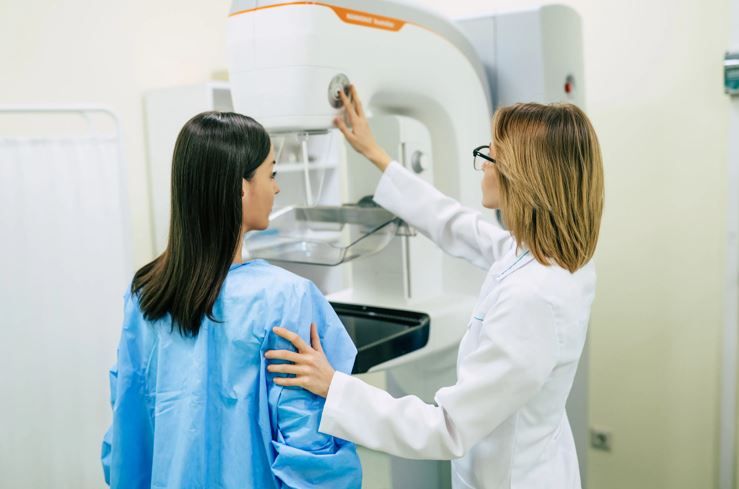- Clinical Technology
- Adult Immunization
- Hepatology
- Pediatric Immunization
- Screening
- Psychiatry
- Allergy
- Women's Health
- Cardiology
- Pediatrics
- Dermatology
- Endocrinology
- Pain Management
- Gastroenterology
- Infectious Disease
- Obesity Medicine
- Rheumatology
- Nephrology
- Neurology
- Pulmonology
A False-Positive Breast Cancer Screening Result Discourages Future Mammography
Those least likely to schedule further screening mammograms had received a false-positive with recommendation for follow-up after only a short interval.
Women who received a false-positive mammography result were less likely to return for recommended repeat imaging within a short follow-up period or for a recommended biopsy, according to findings from a new study that reviewed data from more than 3.5 million screening mammograms among more than 1 million women.1
Researchers from the UC Davis Comprehensive Cancer Center in Sacramento, CA, found that 76.9% of women aged 40 to 73 years who received a true negative screening result returned for subsequent mammography. The likelihood of return decreased most precipitously for women with a false positive recommendation for a short interval follow-up (6 months), followed by a recommendation for a follow-up biopsy, and by a false-positive recall for subsequent imaging only. The decrease was1:
- –1.9 percentage points (95% CI, –3.1 to –0.7 percentage points) following a false-positive recall for additional imaging only
- –10 percentage points (95% CI, –14.2 to –5.9 percentage points) following a false-positive biopsy recommendation
- –15.9 percentage points (95% CI, –19.7 to –12 percentage points) following a false-positive short-interval follow-up recommendation
©My Ocean Studio/stock.adobe.com

Lead study author Diana Miglioretti, PhD, a professor and division chief of biostatistics in the UC Davis School of Medicine's Department of Public Health Sciences, and colleagues reported in the Annals of Internal Medicine, that Asian and Hispanic/Latinx women were the least likely to return following a false positive recommendation for a short follow-up repeat screening (a decrease of −20 to −25 percentage points) or biopsy (a decrease of −13 to −14 percentage points) versus a true negative finding.1 They reported that false-positive biopsy recommendations were most common among Black and other/multiracial women.1
The team also found, and was surprised by the data, that the willingness to return for screening was relatively brittle after a false-positive. Among women who had 2 screening mammograms within 5 years, a false positive result on the second test decreased the probability of coming back for a third one regardless of the findings of the first mammogram; just slightly more than half, 56%, returned.1
The largest absolute differences were found for women who had a false positive with recommendation for a short interval follow-up (−15.7 to −24.0 percentage points) or biopsy (−10.6 to −15.2 percentage points) on the second screening. Differences were even larger if the first result within the 5-year period was also a false-positive vs a true negative, according to the study results.1
Unnerving yet common
False-positive results that lead to additional imaging and biopsies are considered among the potential harms of breast cancer screening, associated with significant anxiety for many women.2,3 And yet, the study authors cite data that show the erroneous results are common and particularly among younger women. Between 10% and 12% of women aged 40 to 49 years will receive a false-positive screening mammogram report, they explained.1 Moreover, between 50% and 60% of women can expect to have at least 1 false-positive screening recall after 10 years of annual screening and up to 12% can receive at least 1 false-positive biopsy recommendation.1
Among women who had 2 screening mammograms within 5 years, a false positive result on the second test decreased the probability of coming back for a third one regardless of the findings of the first mammogram; just slightly more than half, 56%, returned.1
Miglioretti et al did not further investigate the reasons for screening discontinuation but suggested that the one-time experience was negative enough to taint the willingness for continued screening. They provided evidence from current research that found same-day interpretation and work-up of screening mammography "could decrease the anxiety and inconvenience associated with having to return for a second visit."1
For their analysis, the investigators tapped mammography outcome data between 2005 and 2017 from 177 facilities that participate in the Breast Cancer Surveillance Consortium (BCSC) for women aged 40 to 73 years.1
Miglioretti and colleagues estimated the absolute differences in probability of returning within a stretch of 9 to 30 months of a false-positive vs a true-negative screening result. Multivariable adjustment was made for factors including race, ethnicity, time since last mammogram, BCSC registry, and clustering within women and facilities.1
Writing in and editorial accompanying the study,4 Neha Pathak, MBBS, MD, DM, and Michelle Beth Nadler, MD, MSc, from the University of Toronto in Canada, commend the study authors for the large, well conducted study in a diverse population of women that expands on existing findings, which have been inconsistent. Their key concern, however, is that less than 30% of the screening cohort was between the ages of 40 and 49 years, a population that guidelines from the USPSPTF now recommend should initiate screening mammography.4 The reduction in age for first-time breast cancer screening took place after the current study's conclusion, thus the "the choice of using age 40 to 49 years as the “reference group” could influence the observation. They suggest that women in their 40s screened between 2005 and 2017 could have been "systematically different" from women not screened until they were older.
“Miglioretti and colleagues’ study raises important questions about breast cancer screening, particularly in the context of guidelines advocating screening beginning at younger ages. Future studies are needed both to increase our understanding of decreased breast cancer screening attendance after false positives and to evaluate interventions to improve subsequent screening rates,” they wrote.4
